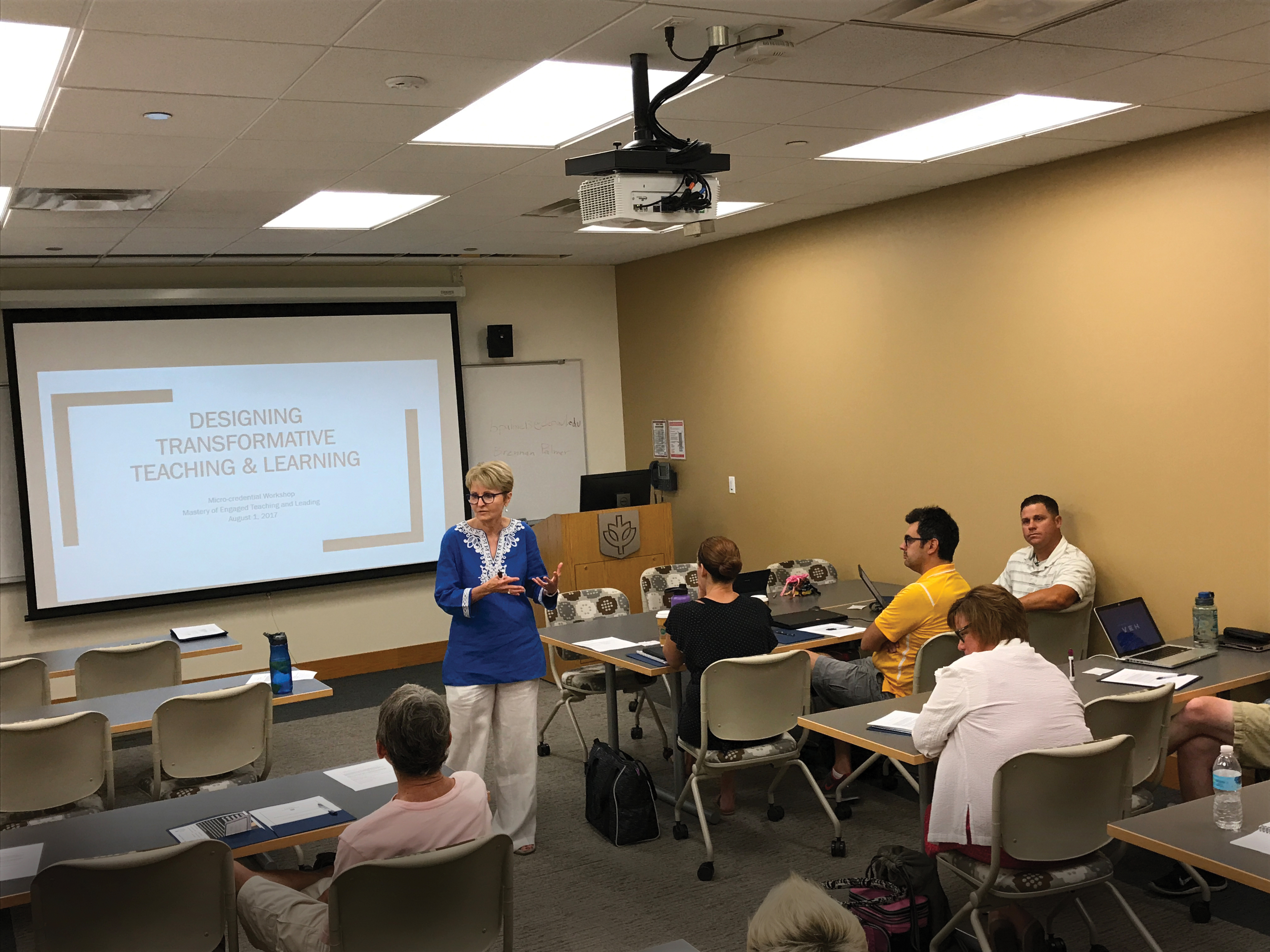
Growing out of a successful pilot begun nearly two years ago, the COE’s micro-credentialing program is expanding into new skill sets, delivery mechanisms and audiences, says Donna Kiel, director of the Office of Innovative Professional Learning (OIPL). Micro-credentials are short-term, competency-based educational programs that enable learners to document their knowledge and skills and have those verified by subject-matter experts.
The U.S. Army created the term “micro-credential” to describe its program to verify for employers that veterans had defined, concrete skill sets, such as the ability to fly planes, Kiel says. OIPL adopted the model for its International Baccalaureate educator certificate program. Once that was firmly in place, Kiel began expanding the topics offered to meet the needs of educators, leaders and other professionals who want to enhance their professional skills.
“We start with what you already know and what you need for professional success,” Kiel says. “Next, we coach you on the theory and skills you need to reach the best-practice level. Finally, we help you design a final project to demonstrate the skills you’ve acquired.”
The course is highly personalized even in a group setting, she says: “It becomes a powerful collaborative-learning program, where the cohort is working together yet each member has an individualized final project and an advisor to guide them.”
That final project elevates the COE’s micro-credentials over mass-market online courses or even taking non-degree college courses, Kiel says. “When professionals complete our program, they have a product, process or program that they can immediately implement in their classroom or organization.”
Micro-credentials are a great way to learn for teachers at St. Laurence High School in Burbank, Ill., which itself follows a project-based approach to teaching and learning, says Pete Lotus, a teacher and administrator there who earned the transformative teaching micro-credential last summer. “The project was the key to the whole process. We feel that applying what the students or we are learning really reinforces the concepts,” he says.
The Power of DePaul
The college currently offers more than a dozen micro-credentials, and new ones are being added all the time. Kiel’s collaboration with Doris Rusch, an associate professor in DePaul’s College of Computing and Digital Media and a nationally recognized game expert, resulted in an innovative micro-credential in game-design thinking for teachers.
“The power of DePaul is that if there’s a need for a skill that we don’t already have a micro-credential for, we’ll design it,” she says. “That’s Vincentian personalism to a T.”
Jason Goulah was quick to recognize how micro-credentials could complement the college’s new Master of Education in Value-Creating Education for Global Citizenship, the world’s only formal degree program on the Soka approach to teaching and education.
“We’ve had a lot of interest, particularly internationally, from people who can’t afford a full master’s degree and don’t need one to be able to teach in their region,” says Goulah, associate professor of bilingual and bicultural education and director of DePaul’s Institute for Daisaku Ikeda Studies in Education. The micro-credentials in value-creating education for global citizenship, which debut this spring, cost about half as much as the credit-bearing courses while covering the same material.
The COE’s contacts in China are very interested in micro-credentials, says Kiel: “They want that cutting-edge solution to learning.”
Simple Registration, Tailored Result
Both individuals and groups can sign up for micro-credentials. Some credentials can be earned fully online. Others blend online and
in-class learning.
The coursework is self-paced. While many participants take a quarter or a semester to complete a micro-credential, others have powered through a program in a week or two.
Finally, micro-credentials are “stackable.” Participants can earn three or four micro-credentials in a specific area and gain certification as a “master” in that arena.
Upon completing the micro-credential, participants receive an electronic badge that they can add to their email signature, LinkedIn profile or other electronic documentation. They also receive a paper certificate suitable for framing.
Goulah’s program takes a different approach. Students who complete four of the 12 courses in the master’s program earn a micro-credential, while those who complete seven courses receive a macro-credential.
Goulah cautions that micro-credentials can’t be used for credit toward a graduate degree. Students need to decide at the outset whether they are pursuing micro-credentials or a degree program.
However, micro-credentials may count toward continuing professional development units (CPDUs), depending on the policies of individual school districts. The programs meet CPDU requirements and educators are able to clock their hours. In addition, the Chicago Public Schools currently are assessing whether micro-credentials count for “steps” in moving up a professional lane, Kiel says.
Micro-credentials also count toward the learning goals of St. Laurence, Lotus says. “Micro-credentials are a really useful tool for us.”
Here are some of the micro-credentials available.
Assessment Expert
Global Educator
Value-Creating Education for Global Citizenship
Innovative Educator
Innovative Leadership
Mindful Leadership
STEM Expert
Transformational Teaching |
For more information about the COE’s micro-credentials and a list
of options, visit blogs.depaul.edu/innovate. To ask about a group session or suggest a new credential, email innovate@depaul.edu.